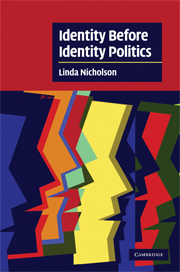Book contents
- Frontmatter
- Contents
- Acknowledgements
- Introduction
- 1 The politics of identity: race and sex before the twentieth century
- Introduction to chapters 2 and 3
- 2 Freud and the rise of the psychological self
- 3 The culture concept and social identity
- Introduction to chapters 4 and 5
- 4 Before Black Power: constructing an African American identity
- 5 Womem's identity/women's politics
- Epilogue: identity politics forty years later: assessing their value
- Index
- Cambridge Cultural Social Studies
2 - Freud and the rise of the psychological self
Published online by Cambridge University Press: 17 July 2009
- Frontmatter
- Contents
- Acknowledgements
- Introduction
- 1 The politics of identity: race and sex before the twentieth century
- Introduction to chapters 2 and 3
- 2 Freud and the rise of the psychological self
- 3 The culture concept and social identity
- Introduction to chapters 4 and 5
- 4 Before Black Power: constructing an African American identity
- 5 Womem's identity/women's politics
- Epilogue: identity politics forty years later: assessing their value
- Index
- Cambridge Cultural Social Studies
Summary
On or about December 1910 human character changed.
(Virginia Woolf, Mr. Bennett and Mrs. Brown)Two stories predominate for characterizing the period from the late nineteenth to the early twentieth century in western Europe and the United States. There is an older story, represented in this quote by Woolf, which sees changes in the early twentieth century as representing a radical break with late nineteenth-century ways of life. Many of those who were proclaiming themselves modern in the early twentieth century saw themselves and their lives as dramatically different from those of their parents in joyous and exhilarating ways. According to the account they and later chroniclers told of the transformation, late nineteenth-century middleclass life was characterized by sexual repression and moral hypocrisy. Members of the middle class shrouded sex in silence, while if male, nevertheless indulging secretly, or if female, becoming repressed and neurotic. Such repressed and hypocritical attitudes towards sexuality were part and parcel of lives which were overly regulated, motivated by conformity, and restricted in joy. Old fashioned and rigid understandings of women's ‘proper place’ placed unnecessary restrictions on women's intelligence and their contributions to society. Such understandings also placed unnecessary obstacles in the way of men's abilities to achieve companionate marriages. To those who came to call themselves flappers, who were taken with the ideas of Freud, or became excited about cubism in art, a new day was dawning. This new day was captured by the enthusiasts of all of these changes in the phrase, “the modern.”
- Type
- Chapter
- Information
- Identity Before Identity Politics , pp. 38 - 64Publisher: Cambridge University PressPrint publication year: 2008

